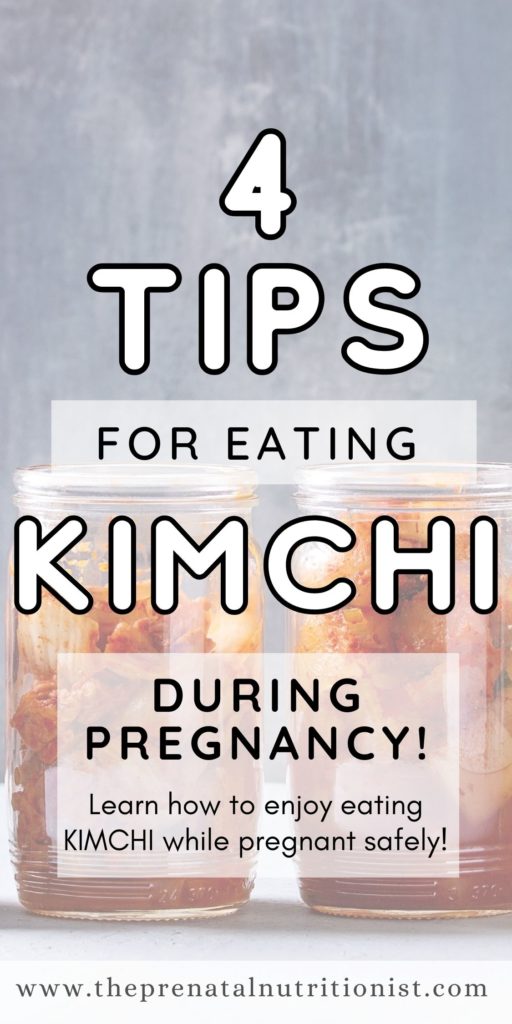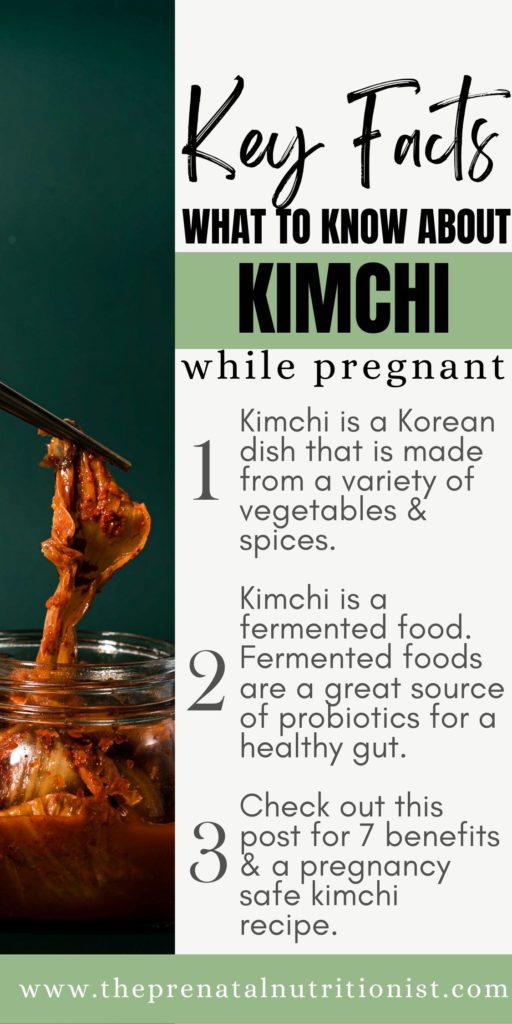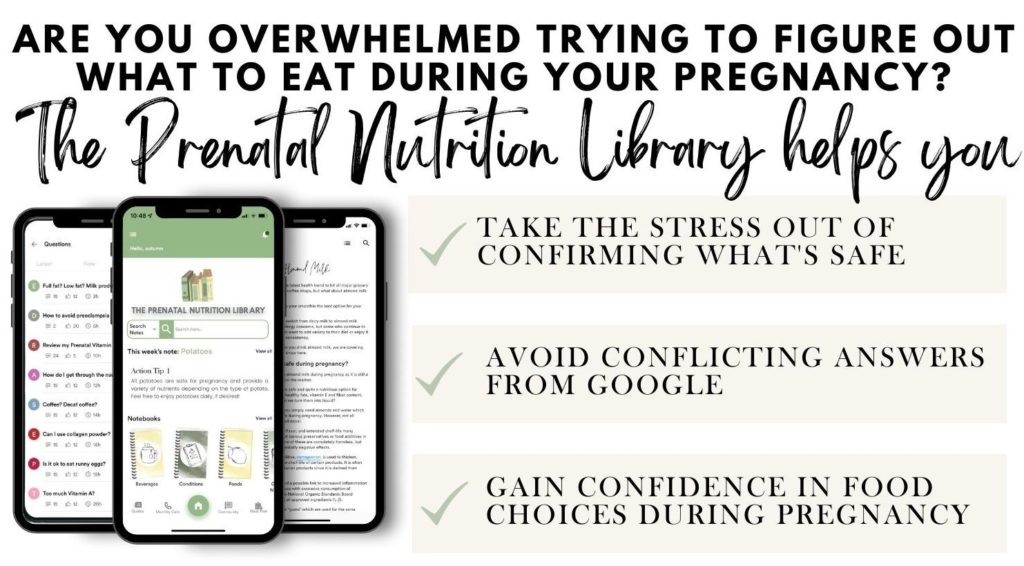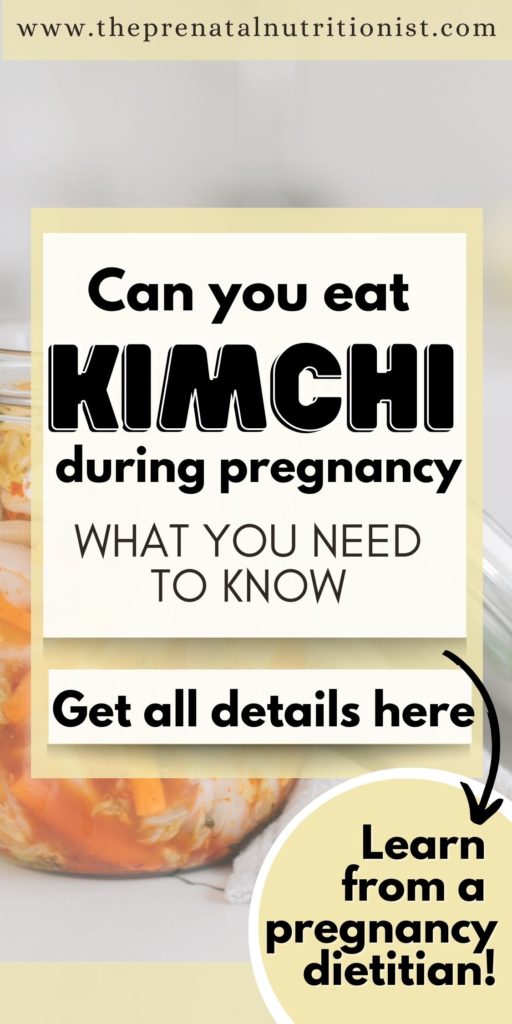
Kimchi is a traditional Korean dish that consists of a combination of different fermented vegetables, salt, and spices. Traditionally, kimchi is made from vegetables, ginger, garlic, chili peppers, fish sauce, and salt. The most common vegetable for kimchi is cabbage, but carrots, radishes, scallions, and cucumbers are also commonly used. The mixture is then pickled and fermented.
Kimchi is a versatile dish that can be an appetizer or be added to soups and other main dishes. It’s loaded with nutrients, flavor, and health benefits. But can pregnant women enjoy the many benefits of this flavorful food? Let’s find out!
Can You Eat Kimchi While Pregnant?
While I encourage the consumption of probiotic-rich foods, like kimchi, during pregnancy, it is ultimately a personal decision. We will review a few things to consider about food safety below.
Kimchi is a fermented food. Unpasteurized fermented foods are a great source of probiotics to support gut health. Eating pasteurized foods and avoiding unpasteurized options is usually recommended while pregnant. Pasteurization is a process that uses heat to kill harmful bacteria and reduce the risk of food borne illness. However, eating pasteurized fermented foods negates the probiotic benefit. Fermented vegetables, like kimchi, are typically safe from harmful bacteria if they are prepared and stored correctly.
You can purchase store-bought kimchi to minimize your risk of contracting a food borne illness. Other food safety tips to consider if you want to eat kimchi during pregnancy. We’ll get into that later.
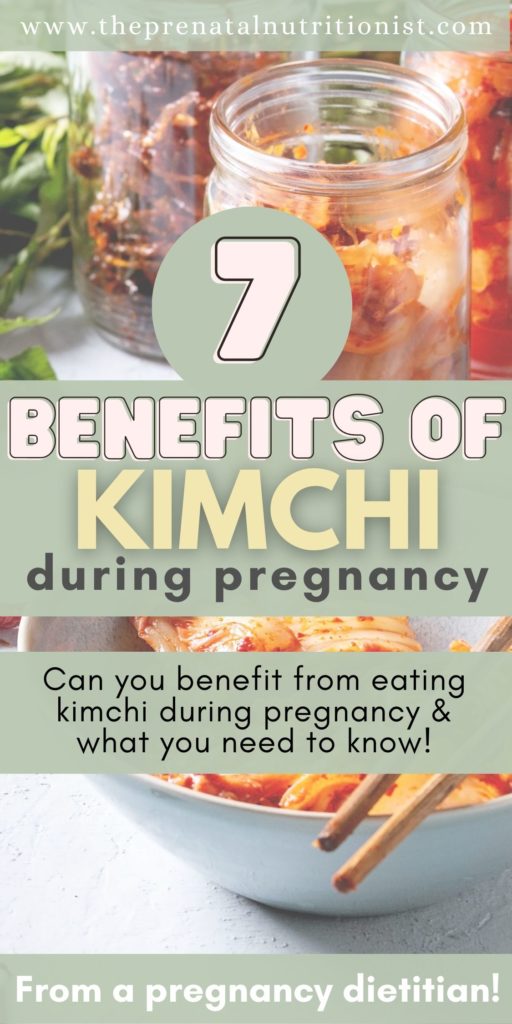
Kimchi Benefits During Pregnancy
- Kimchi is a good source of vitamins A, B6, and C.
- The popular side dish contains non-heme iron, plant-based calcium, selenium, and potassium.
- It’s also high in folate.
- Kimchi is an excellent source of probiotics, which help support your gut health during pregnancy.
- Eating foods rich in probiotics, like kimchi, helps to support your immune system.
- It’s a highly nutritious food providing a few grams of fiber.
- The good bacteria in kimchi may help to prevent or reduce the risk of yeast infections, which are more common during pregnancy.
Tips For Eating Kimchi During Pregnancy
Choose store-bought kimchi versus homemade ones during pregnancy.
Fermenting and canning is a very specialized process. More cases of food borne illness are linked to homemade fermented foods compared to store-bought options. Commercial brands have particular standards to adhere to, regulating bodies, and specialized equipment to help reduce this risk. So, unless you or your family has been in the kimchi making business for years, then stick to store-bought options.
Pasteurized versus unpasteurized kimchi.
It’s true that the FDA recommends pregnant people avoid unpasteurized food to minimize their risk of consuming harmful bacteria. Pasteurization is a process that involves heating foods to kill bacteria and give them a longer shelf life. Outbreaks linked to consuming unpasteurized kimchi are rare; consuming it doesn’t mean you will or would get sick. But there is some risk.
Unfortunately, pasteurization kills both good and bad bacteria. This means you will only get the probiotic benefit if you consume unpasteurized kimchi. Weigh the benefits to the potential risk for yourself. It’s ultimately a personal decision of whether or not you feel comfortable consuming unpasteurized kimchi or not during pregnancy. However, if you choose not to consume kimchi, opting for other foods high in probiotics is important.
Add kimchi at the end of cooking.
Similar to pasteurization, heating kimchi during cooking will kill bacteria. Like heating deli meat, heating kimchi until steaming hot reduces the risk of potentially harmful bacteria but also kills beneficial bacteria. This negates some of the health benefits of eating kimchi.
To preserve the probiotic benefit of kimchi, avoid cooking kimchi with. Instead, add kimchi to your dish after cooking or heating.
Consume kimchi within a few days of opening.
The ingredients in kimchi can be susceptible to the growth of bacteria. Because of this risk, pregnant people should implement good food safety practices. Check expiration dates, store kimchi in the refrigerator, and use kimchi within a few days of opening.
It can sometimes be hard to tell when kimchi has gone bad. Kimchi, past its best, may have a foul smell and sometimes, but not always, visible mold. Once kimchi has “gone bad,” it could contain mycotoxins or other harmful bacteria that can cause food borne illness and symptoms like upset stomach, vomiting, diarrhea, and more, particularly in those with compromised immune systems (like pregnant women). So, just use basic food safety practices!
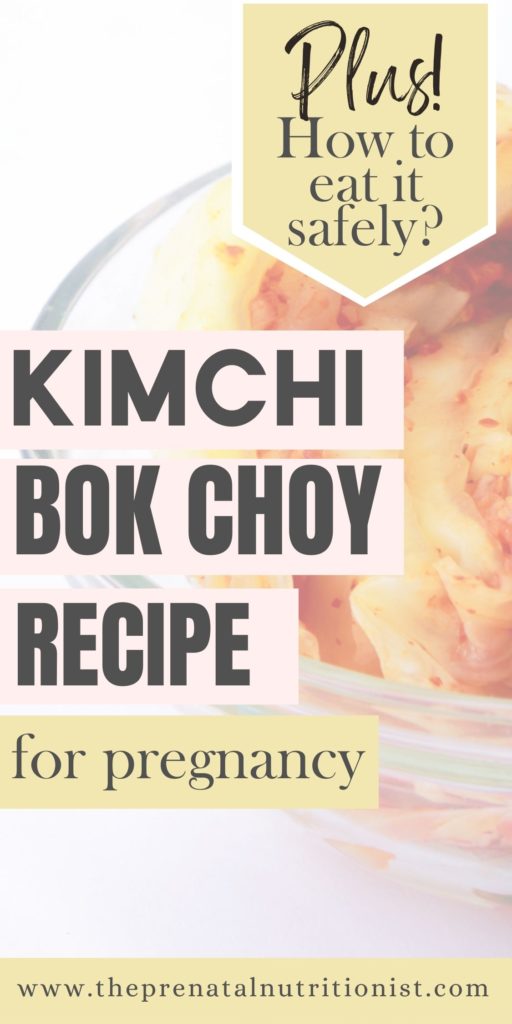
Kimchi Bok Choy Recipe
For a quick and easy (and pregnancy-safe) way to enjoy the incredible flavors of kimchi, try this Baby Bok Choy Kimchi recipe from What Great Grandma Ate. Top it with your favorite kimchi brand to get the fermented food and probiotic benefits too!
Ingredients
- 2 lb baby bok choy
- 3 tbsp sea salt
- 1 small onion cut into chunks
- 1 apple cored and cut into chunks
- 6 garlic cloves
- 1-inch fresh ginger
- 2 tbsp fish sauce or coconut aminos or soy sauce for vegans
- 2 tbsp rice wine vinegar
- 1/4 cup water
- 1/4 cup gochugaru Korean chili flakes
- Optional: sesame seeds for garnish
Directions
- Slice the bok choy lengthwise into quarters, then toss with salt to coat evenly. Let this mixture sit for 30-40 minutes so the bok choy leaves can soften and wilt.
- While the bok choy sits, combine onion, apple, garlic, ginger, fish sauce, rice wine vinegar, and water in a blender. Blend until creamy.
- Add gochugaru to the mixture and stir to combine.
- Rinse the bok choy thoroughly with water a few times to remove salt and dirt.
- Drain and transfer to a large bowl.
- Pour the kimchi sauce over the bok choy leaves.
- Using gloved hands, toss to coat gently to make sure the leaves don’t bruise.
- Taste to adjust the seasoning to your liking.
- Serve sprinkled with sesame seeds, if using.
- Store leftovers in the fridge.
There are many benefits to eating kimchi and other fermented foods during pregnancy.
Kimchi is loaded with probiotics and contains several nutritious ingredients. Keep food safety in mind when deciding whether or not to consume fermented foods, like kimchi, during pregnancy. If you decide to opt out of consuming unpasteurized fermented foods, consider trying probiotic-rich foods like yogurt with probiotics added.
For more information on fueling your body with good nutrition for preconception and pregnancy, join The Prenatal Nutrition Library. Inside our user-friendly and easily searchable app, TPNL provides the evidence-based prenatal nutrition information you’ve been looking for. Learn more HERE. We’ll see you inside!


